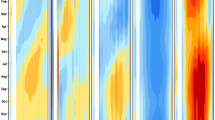Summary
In this study, it is demonstrated that the amplitude of the equatorial upper-ocean zonal current anomaly induced by the fast-varying wind forcing (shorter than a year) is much greater than that induced by the slowly varying wind forcing (longer than 2 year), and the center of maximum zonal current anomaly shifts from the central Pacific to the western Pacific with an increase in the timescale of wind forcing. As a result, the zonal advective feedback (the zonal advection of mean sea surface temperature by anomalous current) in a slowly varying climate system becomes weaker and barely induces a low-frequency mode such as El Niño-Southern Oscillation. On the other hand, both amplitude and zonal location of the maximum thermocline anomaly are little changed by the change in the timescale of wind forcing – confined at the strong equatorial upwelling region of the eastern Pacific. Accordingly, the thermocline feedback (the vertical advection of anomalous subsurface temperature by the mean upwelling) is more favorable to generate a low-frequency mode.
The relative roles of these two feedbacks are further explored under the coupled-system context. The eigen analysis of the stripped-down version of an intermediate ocean-atmosphere coupled model shows that by altering the regime space from the weakly coupled to the strongly coupled, the dominant process that leads the leading eigen mode changes from the zonal advective feedback to the thermocline feedback, and at the same time the frequency of the leading mode also changes from the high-frequency to the low-frequency. It implies that each feedback tends to favor the different timescale coupled mode.
Similar content being viewed by others

Author information
Authors and Affiliations
Rights and permissions
About this article
Cite this article
An, SI. Relative roles of the equatorial upper ocean zonal current and thermocline in determining the timescale of the tropical climate system. Theor. Appl. Climatol. 81, 121–132 (2005). https://doi.org/10.1007/s00704-004-0105-0
Received:
Revised:
Accepted:
Published:
Issue Date:
DOI: https://doi.org/10.1007/s00704-004-0105-0



